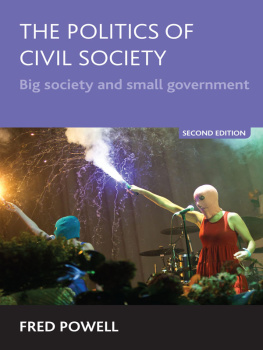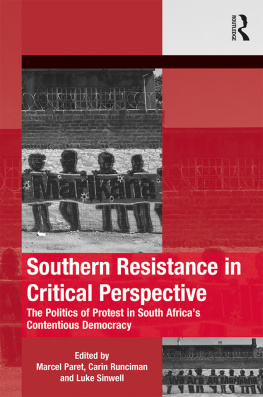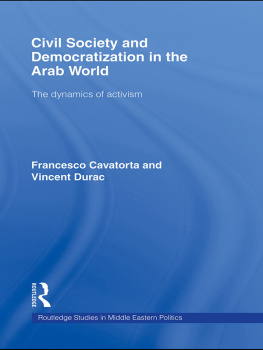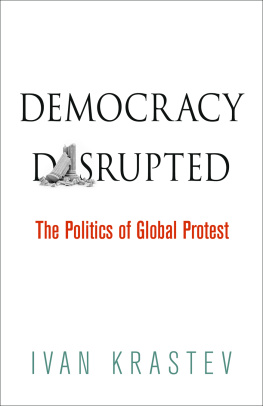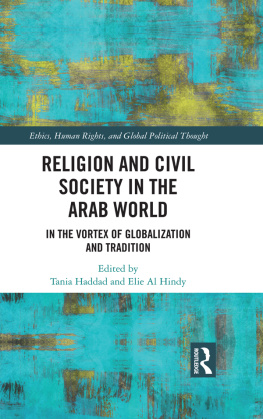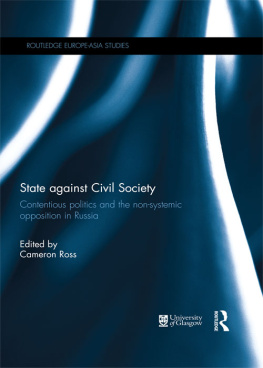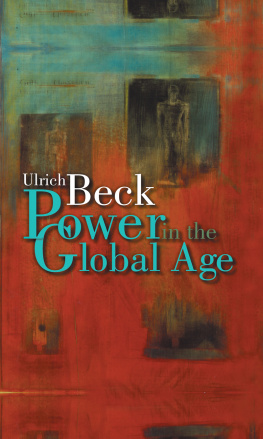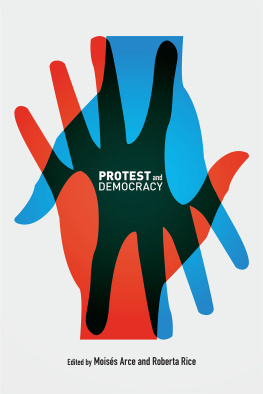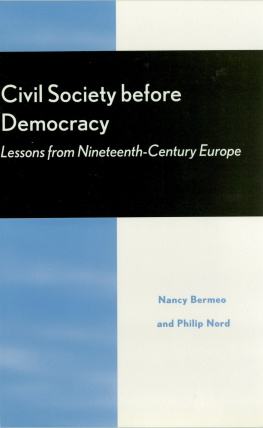THE POLITICS OF CIVIL SOCIETY
Big society, small government?
Fred Powell
First published in 2007
Second edition published in Great Britain in 2013 by
The Policy Press
University of Bristol
Fourth Floor
Beacon House
Queens Road
Bristol BS8 1QU
UK
Tel +44 (0)117 331 4054
Fax +44 (0)117 331 4093
e-mail
www.policypress.co.uk
North American office:
The Policy Press
c/o The University of Chicago Press
1427 East 60th Street
Chicago, IL 60637, USA
t: +1 773 702 7700
f: +1 773-702-9756
e:
www.press.uchicago.edu
The Policy Press 2013
British Library Cataloguing in Publication Data
A catalogue record for this book is available from the British Library.
Library of Congress Cataloging-in-Publication Data
A catalog record for this book has been requested.
ISBN 978 1 44730 714 3 paperback
ISBN 978 1 44730 715 0 hardcover
The right of Fred Powell to be identified as author of this work has been asserted by him in accordance with the 1988 Copyright, Designs and Patents Act.
All rights reserved: no part of this publication may be reproduced, stored in a retrieval system, or transmitted in any form or by any means, electronic, mechanical, photocopying, recording, or otherwise without the prior permission of The Policy Press.
The statements and opinions contained within this publication are solely those of the author and not of The University of Bristol or The Policy Press. The University of Bristol and The Policy Press disclaim responsibility for any injury to persons or property resulting from any material published in this publication.
The Policy Press works to counter discrimination on grounds of gender, race, disability, age and sexuality.
Cover design by The Policy Press
Front cover: image kindly supplied by www.alamy.com
Printed and bound in Great Britain by MPG Printgroup
The Policy Press uses environmentally responsible print partners
Readers Guide
This book has been optimised for PDA.
Tables may have been presented to accommodate this devices limitations.
Image presentation is limited by this devices limitations.
In my humble study I am the most virtuous
I strum my plain old zither, read Buddhist sutra,
No music to grate my ears
No office to tire my mind and soul.
My Humble Study by Liu Yuxi (772847)
Contents
In preparing this book, I am much indebted to four research colleagues, Donal Guerin, Martin Geoghegan, Margaret Scanlon and Katherina Swirak, with whom I had the good fortune to work on three major research projects on civil society in Ireland that resulted in three books: Civil Society and Social Policy (Powell and Guerin, 1997), The Politics of Community Development (Powell and Geoghegan, 2004), Youth Policy, Civil Society and the Modern Irish State (Powell et al, 2012). Their intellectual collaboration has helped to shape my understanding of civil society. I would also like to thank Andrea de Dominicis and Silvia Lombardi of the Centro Italiano di Solidariet di Roma for including me in a European Union study that encompassed the third sector in the Czech Republic, Denmark, Germany, Ireland, Italy, Slovenia, Spain and Sweden. In addition, I am grateful to Anna Kwak and Marek Rymsza of the University of Warsaw for facilitating my visit to Poland during the 1990s and the Council of Europe for funding a ten-country study on the socioeconomic status of youth during 200708, which enabled me to link the experience of civil society to childhood. I would also like to thank Demos for generously furnishing me with its relevant reports during a visit to London. Particular thanks are due to the late Jo Campling for her advice and support in producing this book. Finally, I am much indebted to Rebecca Jeffers, Sinead Hanley, Orla McDonald and Maura OBrien for their patience and diligence in the production of the manuscript, my School Manager, Fionnuala OConnor, for keeping me eternally organised and, finally, my family for their support, understanding and love, and particularly my late father, Dr Anthony Powell, for his inspirational belief in humanity.
To-day the Arab Spring dominates the Arab airwaves. Egypt in particular, where the awakening flowered with the removal of Hosni Mubarak, occupies the Arab psyche as a bellwether, a litmus test of how this new political phase is progressing.
Nasrine Malik, in the Guardian (27 December 2011)
Saturday 3 December 2011 saw a hugely successful pre-budget Parade of Defiance against the IMF-imposed cuts throughout the streets of Cork. This was a creative protest organised by Occupy Cork to show the citys opposition to austerity measures and to raise our voices together against the undemocratic forcing of these cuts on the people of this country. Between 1,000 and 1,200 people marched behind banners with messages such as Not my Debt and This is not a Recession, this is a Robbery.
Occupy Cork (Issue 3, 2011)
The Little People came suddenly. I dont know who they are. I dont know what it means. I was a prisoner of the story [IQ84]. I had no choice. They came, and I described it. That is my work.
Haruki Murakami, in New York Review of Books (8 December 2011)
Three recent events captured the essence of our times. First, the Arab Spring, which, like a tidal wave of liberty, displaced large numbers of tyrants in the MaghrebMashreq region and introduced a new politics of hope. Second, the Occupy movement, which began in Wall Street, New York City on 17 September 2011 and spread across the world. The message of the Occupy movement is a simple one. It opposes the austerity measures imposed on ordinary people around the world, the 99% who, it argues, have been expropriated by the wealthiest 1% of the population. Third, the much-anticipated Haruki Murakami novel published in 2011 entitled IQ84, while clearly inspired by George Orwells 1984 allegory about Stalinist tyranny (Orwell, 1989), takes the reader into a counterworld of unreality, where surveillance is all-pervasive and the Little People hide from a weirdly unsettling Lewis Carroll wonderland of horrors and the horrifying exercise of power over the mesmerised. Both the Occupy movement and Murakamis IQ84 illuminate aspects of the world that we currently inhabit: the dominance of unaccountable and largely invisible systems of power, but also the willingness of citizens to globally struggle against these dark forces. The Little People have become the unsignified signifiers probing behind the mirror of power (Baxter, 2011, p 25). The counterpoint with Orwells Big Brother is striking. Power has become invisible. Big Society is an invented concept, intended to give social meaning to an empty political space.
While events such as the 2012 Olympics remind us that there still exists a visceral loyalty to the nation, the authority of the state, both as an abstract idea and as a tangible set of institutions (for example, public services, parliaments, courts), is increasingly contested. Clearly, in the case of tyrannical states, such as Eastern Europe during 1989 and the MaghrebMashreq region in 2011, uprisings against the state are directly attributable to the existence of repressive regimes. However, the protest movements in the West during 2011, such as the Occupy movement, los indignados, the German Wutbrgers and English riots, occurred in democratic regimes. The totality of these events suggests that the tectonic plates are shifting and the communicative power of citizens is redefining statecivil society relations. Civil society has emerged in this changing context as a force beyond the institutions of the state, family and community that is harnessing new communication technologies (for example, Facebook, Twitter, blogs, Wikileaks, texting and so on) to reframe social and political relations in a globalised world. The pace and scale of these changes is reflected in discursive voices that increasingly take shape outside traditional politics in the forms of digital activism, citizen journalism and new social movements.

